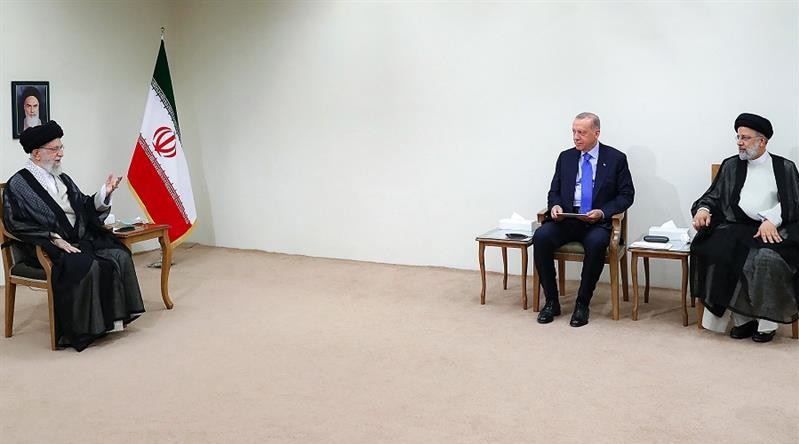Iran’s supreme leader Ayatollah Ali Khamenei on Tuesday told visiting Turkish President Recep Tayyip Erdoğan that any offensive by Ankara in northern Syria would be “detrimental” to the region, Agence France-Presse reported.
His statement came shortly before Iran’s ultra-conservative President Ebrahim Raisi hosts his Russian and Turkish counterparts for talks on the Syrian conflict.
Erdoğan has repeatedly threatened to launch a military offensive in northern Syria to create a “safe zone” that would drive Kurdish militants 30 kilometers (19 miles) back from the Turkish border.
On Tuesday, Khamenei told him that “this is definitely detrimental to Syria, Turkey and the region and will not fulfil the political action expected by the Syrian government.”
“Terrorism must be opposed, but a military attack in Syria will also benefit terrorists,” Khamenei was quoted as saying by his official website.
The Iranian leader called for the issue to be resolved through dialogue between Ankara, Damascus, Moscow and Tehran.
Khamenei, who has the final say in major state policies, also told Erdoğan that Iran would offer cooperation “in the fight against terrorism.”
Erdoğan arrived in Tehran on Monday night, and Russian President Vladimir Putin is also expected to land in the Iranian capital later for Tuesday’s trilateral meeting.
Russia, Turkey and Iran have in recent years met to discuss Syria as part of the “Astana peace process” to end more than 11 years of conflict in the Arab country.
All three are involved in Syria, with Russia and Iran supporting the Damascus regime against its opponents, and Turkey backing rebels.
Turkey has launched waves of attacks on Syria since 2016, targeting Kurdish militias as well as Islamic State of Iraq and the Levant (ISIL) militants and forces loyal to Syrian President Bashar al-Assad.
Erdoğan’s planned military offensive would target militants of the outlawed Kurdistan Workers’ Party (PKK) listed as a terrorist organization by Turkey, the EU and the US.
They include the US-backed Kurdish People’s Protection Units (YPG), which formed a crucial part of an international coalition against ISIL jihadists in Syria.
Ankara fears a strong Kurdish presence along its border with Syria will embolden the PKK, which for decades has been waging a war against the Turkish state that has claimed tens of thousands of lives.
